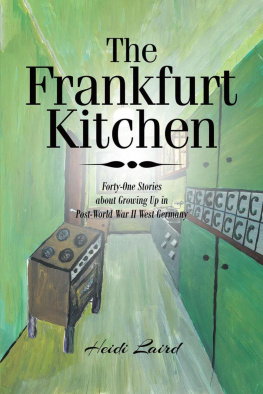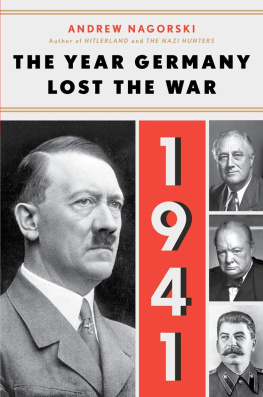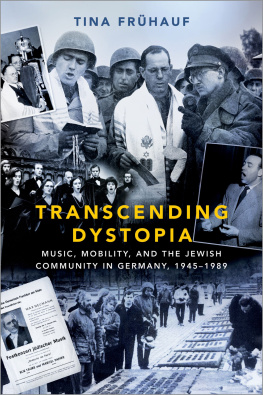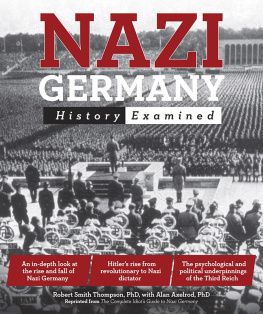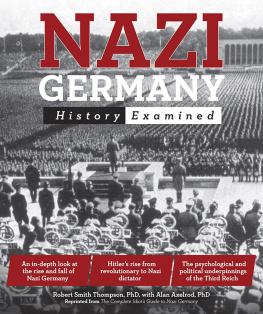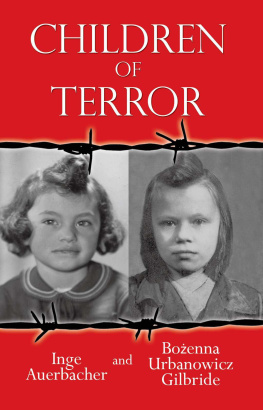Acknowledgements
Over the years, as I told stories from my childhood to entertain family and friends during long car rides, around campfires, and at all kinds of social gatherings, I often heard: You have got to write this down! Finally I did. It took much longer than I ever thought it would, it left me alternately exhilarated and exhausted, and it showed me, as if I didnt already know, how sharply childhood experiences sculpt our character, and how deeply they carve themselves into our souls.
I want all who urged me to write this book to know that I would not have written it without their encouragement and enthusiasm for the project. On the technical front, I learned how to put together a proper book from my loyal and patient publication guide, Shannon Kuno.
On the home front, my husband Ted Knipe provided just the right mix of good advice, objective observations, and enduring emotional support for this sometimes harrowing venture into the realm of remembering.
My thanks to all!
The Jeep Driver
If I wanted to make a movie of my life, the first scene would show my mother, youthful and resolute, with soft hands and vestiges of former elegance, and me, almost eight years old and unafraid, standing in the driving rain of a cold April downpour by the side of the on-ramp to the Autobahn between Heidelberg and Frankfurt, hitchhiking. For a population of war survivors challenged daily by the extreme scarcity of basic resources, hitchhiking had become as normal as standing on a platform, waiting for an unreliable train. Eventually it would come, and you could get on.
It was 1949, and my mother, Vera Schaefer, was on one of her trips to visit my father, Harry Saarbach, in Frankfurt, about an hours drive from Heidelberg. I was with her, as usual, because she took me along wherever she went, maybe because I was her oldest child or because I was her only daughter, an easy and familiar companion. We were drenched, teeth chattering, chilled to the bone, but Vera said that there was an advantage to our dire situation because in this weather, we had no competition from other hitchhikers on this on-ramp, of whom there would have been many on a sunny day. Of course we were extremely grateful when a U.S. Army Jeep stopped for us, and a lean, fit man in an American military uniform came running from behind his vehicle under a dripping tarp, pulled us under the tarp with him, and opened the passenger door, behind which a person was trying to get out of the way so that the back of the seat could be folded forward and we could climb into the rear of the jeep.
When the jeep was moving again, I noticed that the person who had settled back into the front passenger seat was a very pretty young German woman, who smiled at me with an air of beguiling benevolence and then turned to Vera to ask where we were going. She said that she and her boyfriend were also going to Frankfurt and that they would be happy to drop us off at the location where Harry worked. Vera and the soldiers girlfriend continued their conversation across the back of the passenger seat, in German, with occasional questions and commentsin Englishby the kind and generous American who had treated us with so much personal warmth and concern for our safety.
I observed this resourceful man with his crew cut and weathered face as he navigated his jeep through the driving rain, peering through the small upside-down cone on his windshield, which the screeching and whimpering windshield wipers managed to keep clear, while he clutched the handle of the vibrating gearshift with his right hand, calming and reassuring the engine as it bucked and bolted through the deluge. I noticed that he was doing all this while apologizing for the leaks in the jeeps canvas roof and sides, through which heavy drops and rivulets freely entered the interior of this brave little warrior machine. Trying to sort out this adventure in my mind, I sensed that the soldier had spontaneously acted in good faith on his impulse to get a woman and her child out of a punishing rainstorm, disregarding the fact that, as a member of the military force occupying the country of a former enemy, he had broken the unwritten but well-understood rule that transporting unauthorized German civilians in U.S. military vehicles was prohibited.
In the course of this trip, I came to see the jeep driver with my almost eight-year-old eyes as an emissary from the America, which had led the Allies to victory over the Nazi terror. These Americans were generous, well-meaning people who were bringing peace, feeding starving populations, freeing prisoners, and liberating countries from dictatorships. This early adventure of riding in the American jeep set the idealizing tone for my numerous experiences with Americans, which would follow our eventual move to Frankfurt.
What had probably nurtured my early perception of the Americans as a generous people was the ongoing drama of the Berlin Airlift, described daily on the radio and in the movie theaters newsreels, and followed with wonder and disbelief by the German population, including my parents. At the time of my memorable jeep ride, the Berlin Airlift was approaching the end of its improbable ten-month mission to supply the 2.2 million trapped people of West Berlin with absolutely everything they needed to survive the Soviet blockade imposed on them in June 1948. For 322 days, the newspapers and radio broadcasts chronicled the unimaginable feat of one airplane after another landing in Berlin every sixty to ninety seconds, day and night, delivering all the food, medications, dry goods, hardware for machinery repair, shoes and clothing, firewood, and coal, which the besieged population needed during the long blockade. In all, the Berlin Airlift had transported almost two million tons of provisions to the people in the encircled city by the time the blockade was lifted on May 12, 1949. After its successful conclusion, the Airlift quickly became a fabled event and joined the story of the Invasion of Normandy in the record of the defining moments of twentieth-century history. To honor the memory of the seventy-nine people who lost their lives in Airlift-related accidents, a monument greeted travelers for many years as they passed through the Berlin Tempelhof Airport before it ceased operations.
A smaller version of the Airlift was the CARE program, founded in 1945 to provide relief to survivors of World War II. CARE sent hundreds of thousands of packages to individual families, including mine, during the famine years after the war. These cardboard boxes, approximately 20" 16" 18", filled with survival foods like canned meats, evaporated milk, shortening, flour, powdered eggs, and deeply appreciated surprise gifts such as a bar of fragrant soap or a chocolate bar, items which, in the midst of famine, were received with a feeling of reverence, soon followed by fear that this treasure could be stolen if not quickly hidden away in a safe place. One of our CARE packages was, in fact, plundered by a thief who had climbed through a first-floor open kitchen window in broad daylight. I still hear Veras angry cries when she discovered the theft.
A vehement discussion that a curious child could have overheard in the years after the war was about the Marshall Plan, Americas iconic program to restart the ruined economies of Western Europe, including that of the hated and now destroyed Germany. The Marshall Plan was at first rejected by people in Congress who wanted to see Germany plowed under and turned into an agrarian society, which would never again start a war. This was the vision of the secretary of the treasury, Henry Morgenthau. Advocates of the Marshall Plan countered that rebuilding the German industry and helping the Germans create a new version of their first, unsuccessful attempt at democracy would enable them to build a strong economy and produce a rich return on the U.S. investment. The goal of this gigantic project was to make the war zones livable again by removing the mountains of rubble and debris in the cities, finding and defusing the thousands of undetonated bombs and live ammunition that lay beneath the ruins and putting people to work under the direction of the U.S. military government. This initial cleanup would create the environment in which the dead German economy could come back to life and form the basis for future prosperity, security, and political stability in Western Europe. It was argued that in addition to the massive return on the U.S. investment, a grateful former enemy would become an important trade partner and loyal ally in the shifting power dynamics of the emerging Cold War.

